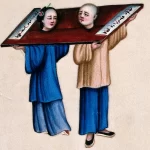Clarity,
Office 17622,
PO Box 6945,
London.
W1A 6US
United Kingdom
Phone/ Voicemail:
+44 (0)20 3287 3053 (UK)
+1 (561) 459-4758 (US).


‘Biting through, creating success.
Fruitful to use legal proceedings.’
Hexagram 21, Biting Through – the Oracle
‘Thunder and lightning. Biting through.
The ancient kings brought light to punishments and proclaimed the laws.’
Hexagram 21, the Image
‘Shoes locked in the stocks, feet disappear.
Not a mistake.’
‘Shouldering a cangue so your ears disappear.
Pitfall.’
Hexagram 21, lines 1 and 6
‘Sending out the ignoramus,
Fruitful to make use of punishing people,
To make use of loosening fetters and manacles.
Going on in that way is shameful.’
‘Striking the ignoramus.
Fruitless to act like an outlaw,
Fruitful to resist outlawry.’
Hexagram 4, lines 1 and 6
‘Bound with good rope and cords.
Shut away in a thorn thicket.
For three years, gains nothing.
Pitfall.’
Hexagram 29, line 6
‘Opposing means outside. People in the Home means inside.’
The Zagua
‘Seeing the cart dragged back,
The oxen stopped,
Your men branded and their noses cut off.
With no beginning, there is an end.’
Hexagram 38, line 3
‘Buttocks oppressed with a wooden stick,
Entering into a gloomy valley,
For three years, meeting no-one.’
Hexagram 47, line 1
‘Nose cut, feet cut.
Oppressed by the crimson knee-coverings.
Then moving slowly brings release.
Fruitful to use offerings and oblations.’
Hexagram 47, line 5
Clarity,
Office 17622,
PO Box 6945,
London.
W1A 6US
United Kingdom
Phone/ Voicemail:
+44 (0)20 3287 3053 (UK)
+1 (561) 459-4758 (US).